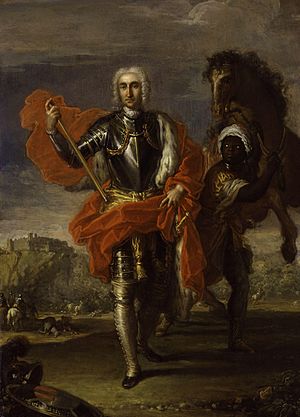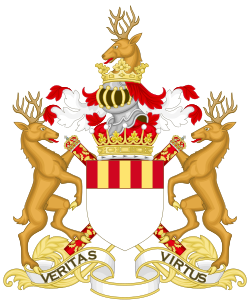George Keith, 10th Earl Marischal facts for kids
Quick facts for kids
George Keith, 10th Earl Marischal
|
|
|---|---|
| Earl Marischal | |

George Keith, 10th Earl Marischal, by Placido Costanzi, c. 1733
|
|
| Predecessor | William Keith, 9th Earl Marischal |
| Successor | None, attainted |
| Born | 1692 or 1693 probably Inverugie Castle, Aberdeenshire, Scotland |
| Died | 1778 Potsdam, Kingdom of Prussia, Holy Roman Empire |
| Father | William Keith, 9th Earl Marischal |
| Mother | Mary Drummond, dau. of The Earl of Perth |
George Keith, 10th Earl Marischal (born 1692 or 1693 – died 1778) was a Scottish army officer and a diplomat. A diplomat is someone who represents their country in other nations. He was involved with the Jacobites, a group who wanted to bring the old royal family back to the throne.
George Keith led Jacobite forces in a rebellion in 1719. Later, he joined the Prussian Army and became a trusted friend of Frederick the Great, the King of Prussia. He worked as Frederick's ambassador (a type of diplomat) in both France and Great Britain. He was the tenth and last person to hold the title of Earl Marischal.
Early Life and Jacobite Rebellions
George Keith was the son of William Keith, 9th Earl Marischal and Mary Drummond. He was likely born at Inverugie Castle in Scotland. In 1712, he inherited his father's important title.
From 1708 to 1711, Keith served in Flanders under the famous general, the Duke of Marlborough. However, he was interested in helping the "Old Pretender" become king of Britain. Because of this, he lost his position in the army.
Keith then joined the Jacobite side in the 1715 Jacobite rising. He fought in the Battle of Sheriffmuir. After this, the British government declared him a traitor. This meant he lost his lands and title.
Life in Europe
After the rebellion, George Keith had to leave Britain. He went to Europe and worked for the Jacobite court, which was like a government in exile. He became their ambassador to Spain.
In 1719, he led a group of Spanish soldiers and Jacobite exiles who landed in Scotland. This was part of the Jacobite rising of 1719. But after they were defeated at the Battle of Glen Shiel, he had to flee back to Europe.
In 1725, the Old Pretender made him a knight of the Order of the Thistle. Later, in 1740, he was named Commander-in-Chief for the Jacobites in Scotland. This was mostly an honorary title, meaning it didn't involve much real power.
Service to Prussia
George Keith became less involved in Jacobite plans. Instead, he started working for Frederick the Great, the King of Prussia. In 1751, Frederick made Keith his ambassador to France.
Keith didn't trust Charles Edward Stuart, who was also known as Bonnie Prince Charlie. He refused to meet the Prince in Paris, only dealing with the Prince's agent. After the Prince fired his agent, Keith stopped talking to him completely.
From 1759 to 1761, Keith served as Frederick the Great's ambassador to Spain. He shared information with the British government about Spain's plans to join the war against France. Because of this, King George II of Britain pardoned him in 1759. This meant he was no longer considered a traitor.
He also got back his right to use his title and own his estates in Britain. Frederick then made him ambassador to Great Britain in 1759. Keith made short trips back to Scotland in 1761 and 1763–64. However, he found the weather and his neighbors there not to his liking.
At Frederick's invitation, Keith sold his estates and returned to Prussia for good. He became a very close friend of the Prussian king. George Keith died in Potsdam, Prussia, in 1778. He received the Order of the Black Eagle, a high honor. He was also a friend and supporter of the famous writer Jean-Jacques Rousseau. His brother, James Francis Edward Keith, also served Prussia as a high-ranking military officer.
A painting of George Keith is kept at the National Portrait Gallery, London.
Arms
|
 | Claudette Colvin |
 | Myrlie Evers-Williams |
 | Alberta Odell Jones |


